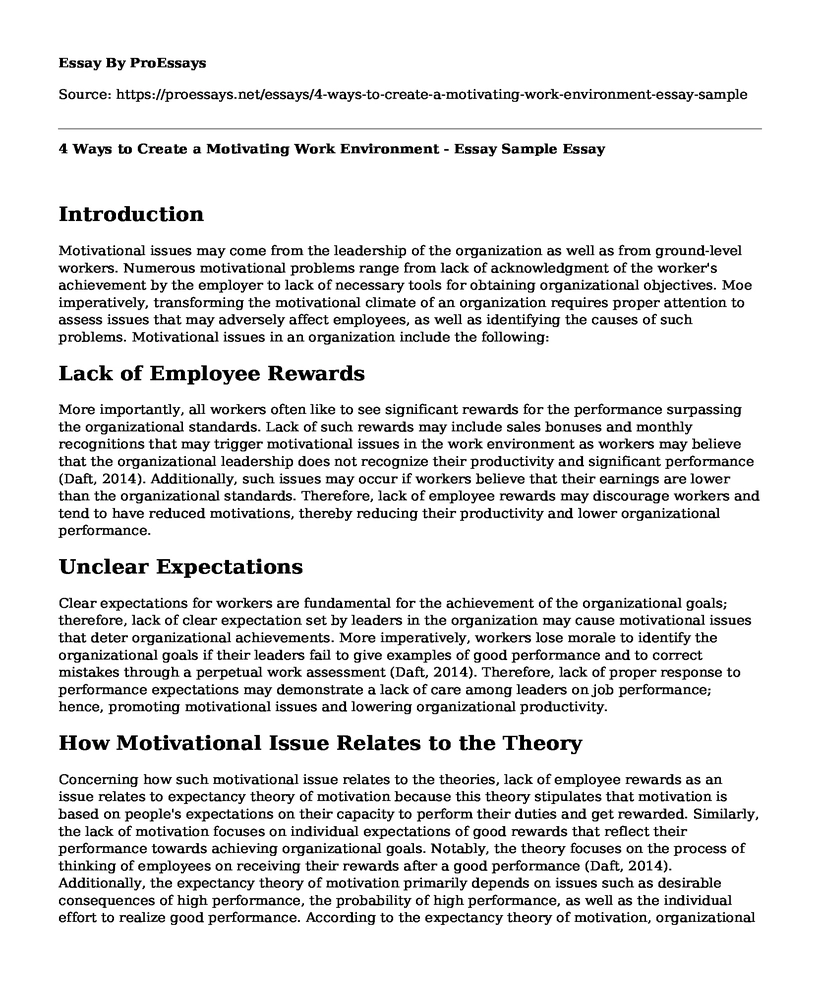Introduction
Motivational issues may come from the leadership of the organization as well as from ground-level workers. Numerous motivational problems range from lack of acknowledgment of the worker's achievement by the employer to lack of necessary tools for obtaining organizational objectives. Moe imperatively, transforming the motivational climate of an organization requires proper attention to assess issues that may adversely affect employees, as well as identifying the causes of such problems. Motivational issues in an organization include the following:
Lack of Employee Rewards
More importantly, all workers often like to see significant rewards for the performance surpassing the organizational standards. Lack of such rewards may include sales bonuses and monthly recognitions that may trigger motivational issues in the work environment as workers may believe that the organizational leadership does not recognize their productivity and significant performance (Daft, 2014). Additionally, such issues may occur if workers believe that their earnings are lower than the organizational standards. Therefore, lack of employee rewards may discourage workers and tend to have reduced motivations, thereby reducing their productivity and lower organizational performance.
Unclear Expectations
Clear expectations for workers are fundamental for the achievement of the organizational goals; therefore, lack of clear expectation set by leaders in the organization may cause motivational issues that deter organizational achievements. More imperatively, workers lose morale to identify the organizational goals if their leaders fail to give examples of good performance and to correct mistakes through a perpetual work assessment (Daft, 2014). Therefore, lack of proper response to performance expectations may demonstrate a lack of care among leaders on job performance; hence, promoting motivational issues and lowering organizational productivity.
How Motivational Issue Relates to the Theory
Concerning how such motivational issue relates to the theories, lack of employee rewards as an issue relates to expectancy theory of motivation because this theory stipulates that motivation is based on people's expectations on their capacity to perform their duties and get rewarded. Similarly, the lack of motivation focuses on individual expectations of good rewards that reflect their performance towards achieving organizational goals. Notably, the theory focuses on the process of thinking of employees on receiving their rewards after a good performance (Daft, 2014). Additionally, the expectancy theory of motivation primarily depends on issues such as desirable consequences of high performance, the probability of high performance, as well as the individual effort to realize good performance. According to the expectancy theory of motivation, organizational leaders can promote foster motivation through identifying employees' needs and providing desirable rewards, as well as ensuring that employees have the capacity and necessary support required to perform and obtain rewards.
More imperatively, lack of clear expectations set by the leaders also relates to the two-factor theory of motivation because this theory stipulates that employees are either satisfied or not satisfied. The theory suggests that the features that are associated with job satisfaction are different from those that are associated with job dissatisfaction. The two-factor theory of motivation relates to a lack of clear expectations because workers can only be satisfied with the job if their leaders set clear expectations since poor expectations do not satisfy the workers in their pursuant to good performance for the realization of the organizational goals (Daft, 2014). More importantly, organizational policies that are set by the managers determine the behavior of workers; for example, expectations can be too high for the employees to realize, thereby demotivating workers and enhancing job dissatisfaction.
How to Apply Leadership and Motivational Theories
Organizational supervisors can apply the great man theory of leadership to influence workers to perform several activities in the organization. The theory perceives leaders, especially the male leaders, as more powerful and can influence other junior workers in the organization, thereby enhancing morale and motivation towards increasing organizational performance. For instance, supervisors may portray diverse and heroic characters that are capable of influencing people in the organization. Supervisors can make other workers follow a new policy that would significantly transform the organization (Daft, 2014). Based on trait theories of leadership, supervisors may possess specific traits that cannot be found on other workers, for example, having traits of intelligence that can separate the supervisor from the non-leaders and leads to organizational success. Therefore, supervisors can use their intelligence in the organization for the achievement of the set goals.
Regarding behavior theories, supervisors can utilize the theory to pursue behaviors that are focused on their responsibilities rather than their personality. How supervisors behave with the junior workers determines the success or failure of the organization, and good behaviors are associated with effective leaders. Behavior theory is based on how the supervisors behave towards their followers and the correlation of such behaviors to the efficacy of the organizational leadership. More significantly, supervisors can as well use contingency theories to critically analyze their conditions with a motive of changing their behaviors to enhance leadership effectiveness (Daft, 2014). Again, their situations should always be different from those of the other workers and focused on improving their style of leadership.
References
Daft, R. L. (2014). The Leadership Experience. Cengage Learning.
Cite this page
4 Ways to Create a Motivating Work Environment - Essay Sample. (2023, Mar 28). Retrieved from https://proessays.net/essays/4-ways-to-create-a-motivating-work-environment-essay-sample
If you are the original author of this essay and no longer wish to have it published on the ProEssays website, please click below to request its removal:
- Paper Example on Ethics and Whistle-Blowers
- Applying the Cognitive Process Loop Paper Example
- Essay Sample on Personalities in the Workplace
- Essay Example on Embrace Diversity for Creative Success: Nissan's Cross-Cultural Approach
- Essay Example on Culture Conflict: Impact on Member Perceptions in Groups
- Essay Example on Jane and John: Conflict in Apple's Finance Department
- Free Essay Example on 4 Planning Styles: Conflict & Compatibility







